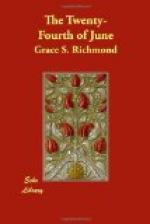“No, indeed. I’ve been too busy with the close of school to ride anywhere—much less away out here.”
“You like my choice, then? I hoped you would.”
“Very much.”
It was a queer, breathless sort of talking; Roberta hardly knew what she was saying. She much preferred to ride along in silence. The hour was at hand—so close at hand! And there was now no getting away. She knew perfectly that her agreeing to come at all had told him his answer; none but the most cruel of women would allow a man to bring her upon such a ride, in the company of other interested people, only to refuse him at the end of it. But she had to admit to herself that if he were now exulting in the sure hope of possessing her he was keeping it well out of sight. There was now none of the arrogant self-confidence in his manner toward her which there had been on the February night when he had made a certain prophecy concerning Midsummer. Instead there was that in his every word and look which indicated a fine humility—almost a boyish sort of shyness, as if even while he knew the treasure to be within his grasp he could neither quite believe it nor feel himself fit to take it. From a young man of the world such as he had been it was the most exquisite tribute to her power to rouse the best in him that he could have given and she felt it to the inmost soul of her.
“Here are the forks,” said Richard suddenly, and Roberta recognized with a start that they were nearly at the end of their journey.
“Which way?” Stephen was shouting back, and Richard was waving toward the road at the left, which led up the steep hill.
“Here is where you dropped the bunch of rose haws,” said he, with a quick glance as they began the ascent. “I have them yet—brown and dry. Did you know you dropped them?”
“I remember. But I didn’t suppose anybody—”
“Found them? By the greatest luck—and stopped my car in a hurry. They were bright on my desk for a month after that; I cared more for them than for anything I owned. I had the greatest difficulty in keeping my man from throwing them away, though. You see, he hadn’t my point of view! Roberta—here we are! Will you forgive what will seem like a piece of the most unwarrantable audacity?” He was speaking fast as they came up over the crown of the hill: “I didn’t do it because I was sure of anything at all, but because—it was something to make myself think I could carry out a wish of yours. Do you remember the ’stout little cabin on the hilltop’, Roberta? Could you—could you care for it, as I do?”
The last words were almost a whisper, but she heard them. Her eyes were riveted on the outlines, two hundred feet away through the trees, of a small brown building at the very crest of the hill over-looking the valley. Very small, very rough, with its unhewn logs—the “stout little cabin” stood there waiting.




